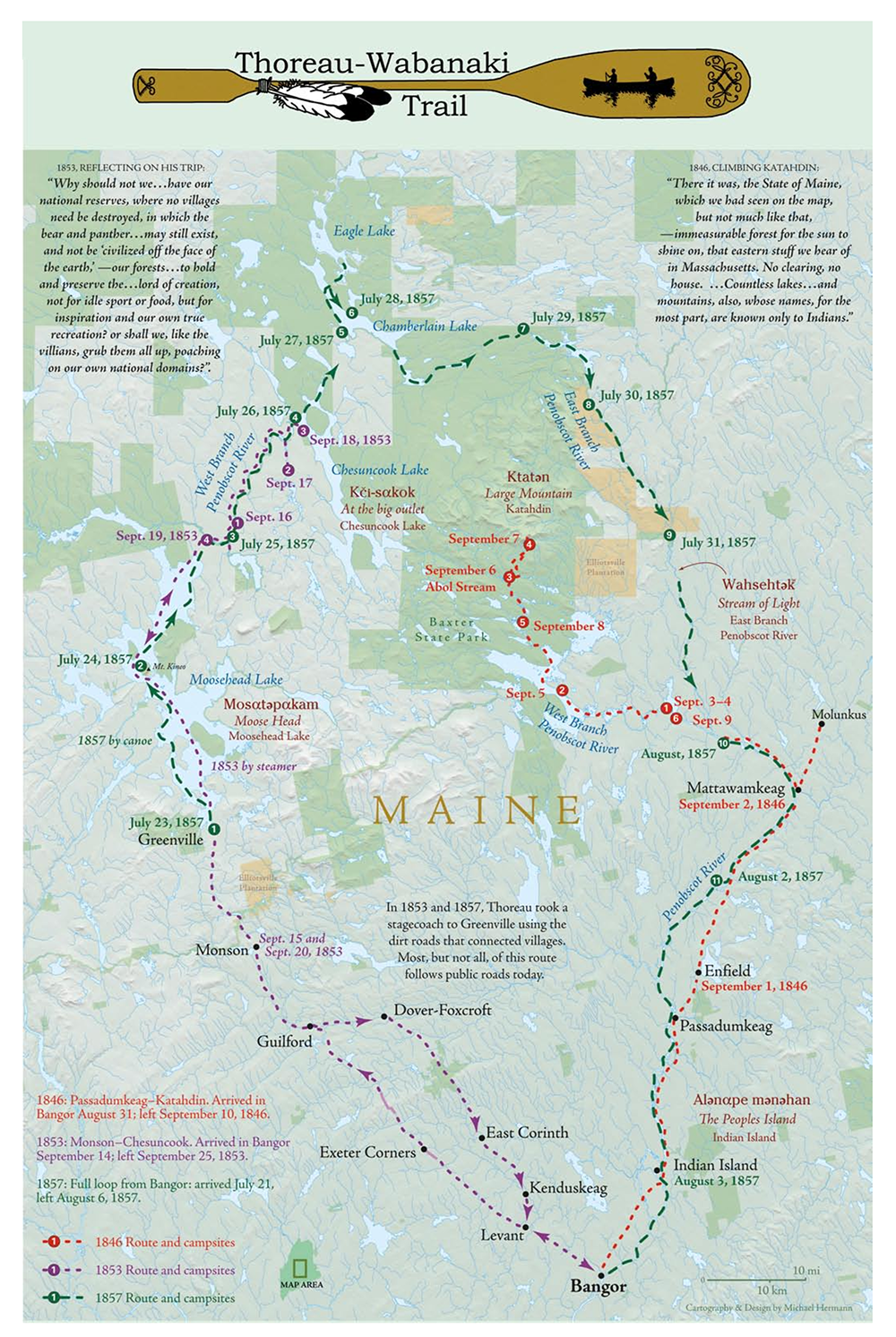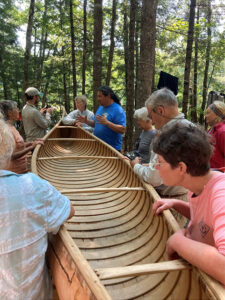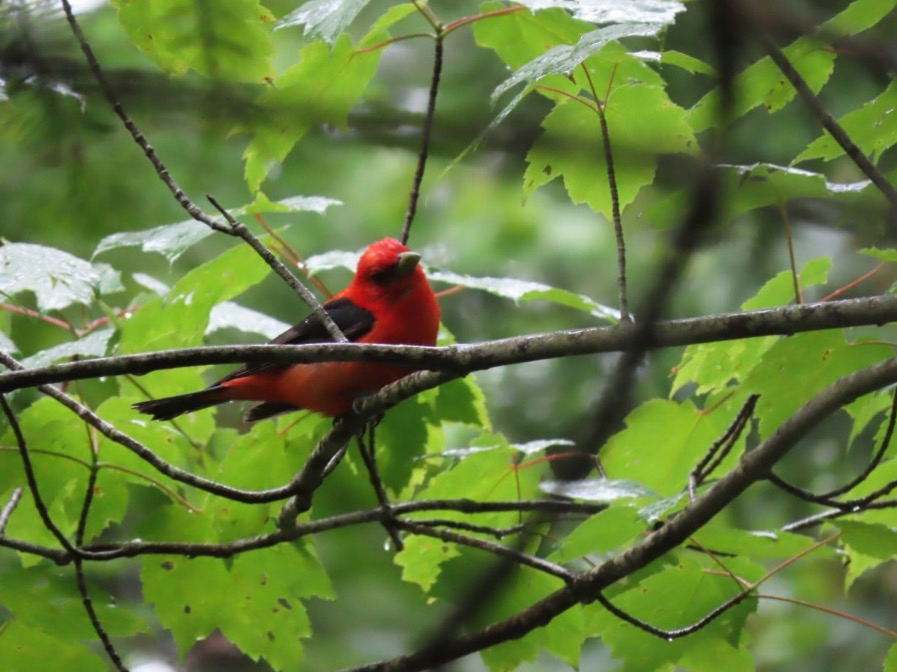Note from NEFF Communications Manager Tinsley Hunsdorfer: NEFF’s Meaghan Guyader—the author of this piece—has lived in Maine for the past year, and has been both commuting occasionally to NEFF headquarters in Massachusetts and juggling Executive Assistant duties while hundreds of miles away from much of the staff she supports. Meaghan has worked miracles in these circumstances, but she recently found a job in Maine that will provide her with a healthier way to live. This means you’re about to read her grand NEFF finale, a blog post about a cause to which she is deeply and compassionately committed: decolonizing conservation practices. Meaghan, we’ll miss you terribly—best wishes for all that lies ahead.
Henry David Thoreau is well known for his musings while living at Walden Pond in Concord, Massachusetts , but it was his travels to the North Maine Woods that truly shaped his perspective on the natural world. The influence of Maine’s landscape and Penobscot Guides on Thoreau are still honored to this day by the community surrounding a festival in Greenville, Maine—the Thoreau-Wabanaki Trail Festival.
The festival’s namesake, the Thoreau-Wabanaki Trail, is a 400-mile loop that extends from Bangor to the northern border of Baxter State Park (map). The path pieces together the woods and waters traversed during Thoreau’s three trips into the Maine Woods: the 1846 trip to Mt. Katahdin, 1853 trip to Chesuncook Lake guided by Joe Attean, and 1857 trip from Moosehead Lake to Indian Island guided by Joe Polis. The 325-miles of water between Greenville and Indian Island follow Native canoe routes that have been significant to the Penobscot people since time immemorial. In 2014 (and see this CBS video for even more information), a group of Penobscots and outdoor devotees repeated the 1857 trip to commemorate the 150th Anniversary of The Maine Woods. James Francis, the Penobscot Nation’s Director of Cultural and Historic Preservation and participant in the 2014 trip, reflects on the impact Penobscot Guides had on Thoreau in this video:

Map of the Thoreau Wabanaki Trail, Courtesy of Maine Woods Forever
Print copies available for purchase via Maine University Press
Mapping the trail was an undertaking of Maine Woods Forever, a nonprofit organization devoted to protecting the legacy of Maine’s forests and woodlands who also founded the festival in 2006. Now in its 18th year, the festival is its own 501c3 nonprofit. The week-long event, held this year from July 21-26, featured lectures and outdoor field trips that provided an intimate setting for knowledge and cultural exchange in celebration of the Maine Woods. NEFF sponsored the event this year, and I had the pleasure of attending and acting as supporting staff to the festival’s President, Suzanne AuClair.
The festival kicked off with a canoe trip hosted in collaboration with the Penobscot Nation’s Cultural and Historic Department. I joined 13 others in an immersive experience of Wabanaki lifeways while spending three days (July 21-23) on the Penobscot River and on islands that have always remained Penobscot territory despite European colonization elsewhere in Maine.

Jason Pardilla (blue shirt) talks through the process of building birch bark canoes and shares their cultural significance to the Penobscot people. Photo: John Kucich
Throughout the trip, Penobscot guides shared their knowledge of plant identification, the craftsmanship and cultural significance of birch bark canoes, and the stories embedded in the Penobscot names of the landscape. The non-Native participants were a dynamic mix of members of the Thoreau Society, a group of volunteer stewards from Wood Island Lighthouse, and others with ties to the Moosehead Lake region.
We slept in lean-tos, shared meals together, and listened to Penobscot songs and stories around the campfire each night. The exchange brought about thoughtful questions and anecdotes that deepened each of our understanding of our relationship to land and the significance of Wabanaki people’s relationship to this land. On the final day of the trip, we paddled from Sugar Island to Indian Island, retracing an 11-mile stretch of Thoreau’s journey with Joe Polis. After we said our goodbyes, I drove along back roads to Moosehead Lake where the remainder of the festival took place.
The canoe theme continued into Wednesday. During the afternoon, old friends and master canoe builders Rollin Thurlow and Jerry Stelmok showed off their wood-and-canvas canoes at the Depot in Greenville Junction. I spoke at length with Rollin and learned about the history and following of his world-famous Atkinson Traveler canoes. He emphasized the importance of his relationships with local sawmills to source canoe-length, 17.5-foot long spruce and white cedar that form the gunnels and hulls of each canoe.
I also had my first of many delightful encounters with Master Maine Guide Alexandra Conover Bennet, whose paddle-making work was also featured in the expo. Alexandra developed her traditional travel and wilderness skills while living with Native families and apprenticing with the legendary Maine Guide, Mick Fahey. After retiring from co-owning the guide service North Woods Ways, she now focuses on teaching these skills to the next generation of outdoors men and women at College of the Atlantic. Here you can see Alexandra in her element, demonstrating her skill with a wooden canoe paddle:
As Wednesday night fell, a group gathered in Greenville’s Lakeside Center to hear Ryan Ranco Kelley recount the 1,800-mile canoe trip he completed with two others in summer 2023. Pictures and video from the journey colored the snippets of tales Ryan shared while guiding our group on the Penobscot river. The loop was planned to travel the old Native trade and canoe routes, and along the way, certain legs were supported by other tribes along the route. Read more about a notable section between Boston and New York harbors.
Thursday was for the birds. The day started with Bob Duschene—radio personality and published birder—leading a group to spot birds on a walk through Shirley Bog. His secret sauce for calling birds out? An mp3 of layered chickadee calls that he mixed himself. In the afternoon, Alexandra Conover Bennet led a walk through the woods of Little Moose Mountain. Some new birds showed up with the shift to forest habitat. Most notable was our multiple encounters on the way in and out of the trail with a spunky, juvenile Scarlet Tanager (see photo by Elaine Colella below).
As we walked along, Alexandra shared nuggets of wisdom and words of encouragement for new birders. She encouraged us to have light-hearted, celebratory relationship with being wrong since it’s a fundamental part of learning. As she says, every birder gets their start with one bird, and then it’s a matter of staying curious. For the evening’s lecture, Kate Weatherby shared the grand efforts of citizen scientists to track birds breeding and wintering in Maine. You can learn about the Maine Bird Atlas here.

The scarlet tanager that kept visiting our birding group led by Alexandra Conover Bennet at Little Moose Mountain. Photo: Elaine Colella
Friday was the 20th Anniversary Celebration of Maine Woods Forever. As a person new to conservation, it was a great opportunity to meet the depth of people with a love for the Maine Woods. Two of them, Bryan Wentzell of Maine Mountain Collaborative and Kristen Peet of Appalachian Mountain Club, allowed me to tag along with them for a visit to Scammon Ridge, a 3,000-acre parcel just to the northeast of Greenville Maine that was recently conserved by a major collaboration between conservation organizations, including NEFF!
On Friday evening, Dr. Darren Ranco shared the fruits of his sabbatical from his professorship at UMaine, which he devoted to launching the Wabanaki Commission on Land & Stewardship. The group, composed of representatives from the five Wabanaki tribes in Maine, is working to reunite Wabanaki people with their homelands without restriction or cost. Dr. Ranco drew comparisons between Thoreau and Joe Polis’ relationship and the modern-day collaboration developing between the Wabanaki Commission of Land and Stewardship and a coalition of Maine conservation organizations known as First Light. Land return will be a long process, but there are major strides to report. To date, 2,500 acres have returned to the tribes of the Wabanaki Confederacy with another 30,000 pending on the East Branch of the Penobscot river aided by short-term action capabilities of Trust for Public Land.
A fundamental person in all this mix is Suzanne AuClair, a cornerstone in the Moosehead Lake community and now the President of the Thoreau-Wabanaki Trail Festival nonprofit. I wish to offer a special thank-you to her for letting me work alongside her that week and be a part of her world.
The North Maine Woods are filled with deep relationships that reflect the humbleness, humor, and healing that comes from exchanging culture and sharing experiences in the North Maine Woods.
I’m so honored I was welcomed in. I hope NEFF continues to sponsor and participate in the festival for years to come. The festival has a long history of mixing up their programming and always welcome new comers, so be on the look out for next year’s itinerary!




